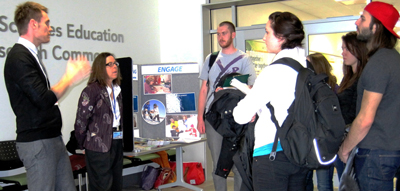
City of Edmonton recreation practitioners meet with recreation and leisure students to discuss the realities of recreational program delivery in the community.
The Commons, with its dedicated lab spaces, barrier free "smart condo", spacious breakout rooms and lounges for team-learning, proved an ideal venue for plenty of interactivity between practitioners and students, who spent 20 minutes at each of four interactive learning stations. Alberta Recreation and Parks Association, Alberta Therapeutic Recreation Association, the Glenrose Hospital and the City of Edmonton all participated and were very enthusiastic about doing so. Students had questions prepared for them related to the communications aspects of recreational program delivery and they dived in with enthusiasm," said Fox.
"We had very thought-provoking questions from the students," said Susan Dack, community recreation coordinator with the City of Edmonton, adding that student/practitioner exchanges were valuable learning events. "One important factor is for students to have a reality check - in class they often learn a lot of theory and for them to be able to see how they might apply that theory to the real world is vital," she said.
As they did the rounds of four stations, students asked practitioners about their professions in the recreation field and related communications matters, worked on problem-solving communications scenarios, and visited a mini trade show of participating organizations.
For student Rebecca Kaiser, who wants to work in community development, one of the most valuable lessons was "seeing all the skills that we've been learning in class actually applied and being able to use that knowledge in a real scenario." Jaron Yeo enjoyed working on a real-life scenario solving communications problems in a recreation setting. "We had just been talking to one of the facilitators about communication strategies, so we knew what to keep in mind when communicating with others and not to just assume people are listening or understand what you are saying." Tomiko Morris, who is drawn to sport development and tourism, says, "Going to the different stations was very cool that way. What we learned will come in handy in class and also once we're in the working world."
"This has been a big success," says Fox. "Students want to know: 'How is what I'm learning going to apply? Where do I come in? What do I know and what do I need to know? Now we have the discussion about how to use the skills they're acquiring, and where they go next."
Would she choose HSERC again for next year's event? "Most definitely, she says. "HSERC has a variety of simulations and inter-professional events in which recreation and physical education students could really play a vital role, such as when people are transitioned from hospitals. We need to adapt to and begin to address the needs of an ever-changing population that is aging, experiencing disabilities, has different abilities, comes from different cultural perspectives, or born within the Internet age.
"Importantly, using this space provides a presence for the Faculty of Physical Education and Recreation among the health sciences faculties on campus as we all explore the challenges of working across disciplines and professions. And as the world changes, all professions related to health and well-being need to rethink how we bridge transitions from medical facilities to community-based programs and home settings. We need both special care facilities and programs that enlarge our understanding of who participates in general community recreation so all of us live, work, and play in diverse, inclusive communities."
Look at our album
 |
| RLS 230 - Thinking outside the leisure box |